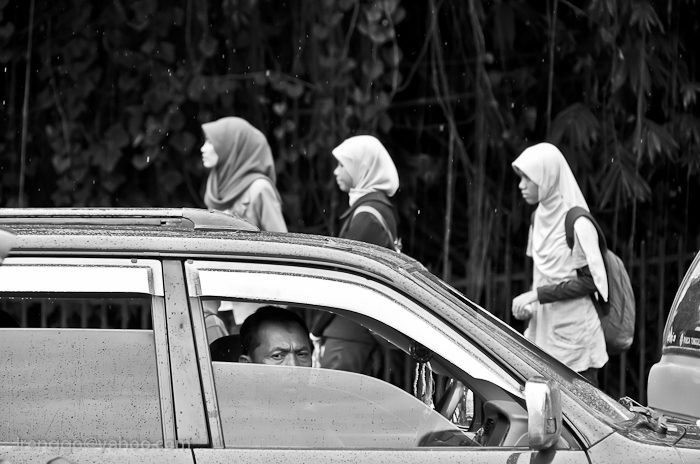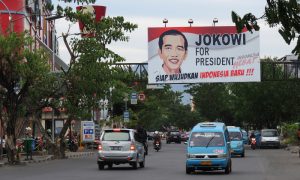In the near future, it’s possible Indonesia will make all sexual activity outside heteronormative marriage illegal. This would be a radical move for a country that’s never criminalised homosexuality, for the most part considering private consenting adult sexual activities a matter for individuals not the state.
The 2016 ‘LGBT crises’ and the 2020 proposed Family Resilience bill (both discussed below) are stark clues to the direction Indonesia is taking when it comes to punitive sexual surveillance. But the antecedents of these moves—which we might collectively call Indonesia’s moral turn—are much deeper and can be traced to the early years of democratic reform.
Indonesia’s immediate post-democratic trajectory gave hope that sexual and reproductive rights would be protected. But Indonesia has turned increasingly towards profoundly and punitively regulating the moral lives of people.
The phrase ‘moral turn’ is a useful way to capture this trend. Indonesia’s moral turn shares many features with the nation’s ‘illiberal turn’, ‘conservative turn,’ and ‘authoritarian turn’, and can perhaps be thought of as a smaller part of these larger trends. ‘Moral turn’ is simply a way of drawing together the raft of changes across the archipelago under what might broadly be considered a moral banner.
At its most basic, morality is concerned with distilling right from wrong, good from bad. While ethics may be codified in law (for example, in a Code of Ethics), morality is often concerned with more private aspects. For instance, many people might consider adultery immoral (that is, bad), but few states send people to prison for it. Moral issues are also often those considered contingent—there is no clear right or wrong. For instance, narcotic use might be a moral issue because some people consider it acceptable, others not.
Here I focus on sexual morality and specifically attempts in Indonesia to frame sex outside marriage as so immoral it should be criminalised. What are the drivers of Indonesia’s moral turn? While there are many, here I look at four: religion, education, politics and social drivers. These and other factors have created a perfect storm positioning morality, and especially sexual morality, as the point on which Indonesia’s national wellbeing is considered by many to be hinged.
Evidence of a moral turn
For many observers, the first clear sign of the moral turn was the 2008 ratification of the Pornography Law, which came not coincidentally just two years after the release of the inaugural issue of Playboy. While the law was a watered-down version of the original, it still severely restricted sexual expression. For instance, Article 1 of 45 states that pornography is ‘pictures … conversations, movements of the body … in public which contain obscenity (kecabulan) or sexual exploitation which violates the moral norms (kesusilaan) in society.’ Given this sweeping definition, it is not surprising the law has been used to persecute lesbian, gay, bisexual and transgender (LGBT) Indonesians.
While the Pornography Law stands as a watershed moment in Indonesia’s moral turn, the foundations of this turn were laid in the early 2000s. Indeed by 2004, various provinces across Indonesia had taken advantage of decentralisation to implement draconian laws against sexuality. Palembang, for instance, became just one of many provinces to criminalise prostitution, and from my understanding, the law has been interpreted as defining homosexuality as an act of prostitution. This trend continued for the rest of the decade.
While overt examples of the moral turn were harder to discern between 2010 and 2015, taken together events show a clear moral push. Examination of two events related to policewomen is illustrative.
Women have been part of Indonesia’s police force since 1948. Yet in 2005 they were banned from wearing the Muslim headscarf (hijab) on duty, possibly for the first time. In 2013, Muslim policewomen and their supporters won the right to veil on duty, drawing partly on a human rights discourse.
Just a year after this, Human Rights Watch reported on the ongoing practice of virginity testing for women as part of police recruitment. Some policewomen publicly vocalised abhorrence towards the practice, ongoing since at least 1965. But many were proud of it, arguing that it is a way to prove sexual morality. Certified as sexually moral, policewomen could then irrefutably position themselves as able to police sexual morality among citizens.
Together, these events are indicative of Indonesia’s ongoing moral turn between 2010 and 2015. For instance, policewomen and their supporters fought for the right to wear the veil because they felt that wearing the veil was a way for them to showcase a moral self. Similarly, the fact that virginity testing is still practiced during police recruitment, combined with the fact that some policewomen supported it (and only a few publicly stated their opposition to it), shows that morality is of central importance. Policewomen must show they are moral and that they can protect their morality.
The year 2016 might be best remembered for two not unrelated events in respect to Indonesia’s moral turn: the ‘LGBT crises’, and the blasphemy trial of then Jakarta Governor Basuki Tjahaja Purnama (better known as Ahok).
Much has been written about both these events, making clear they indicate exponential growth in Indonesia’s morality focus. In short, the ‘LGBT crises’ saw radio and TV shows banned from airing programs presenting LGBT identities as ‘normal,’ the rejection of UN funding earmarked to support LGBT communities, and numerous anti-LGBT protests that police refused to disrupt. These interventions were most virulent during the first half of 2016.
The anti-LGBT protests were likely dwarfed by the anti-Ahok protests, which reportedly saw numbers around half a million. But they made clear that anything interpreted as being against Islam, whether homosexuality or blasphemy, was now a legitimate target of violent action.
By the end of 2016, any illusion of the separation of state, religion and sexuality had shattered. In 2017, Indonesia’s Constitutional Court narrowly rejected a petition to make extramarital sex illegal in a 5/4 vote. The Court rejected the petition, noting that such a change fell outside their remit, and suggested the petition be presented to parliament. The inference is that the Court did not disagree with the petition per se, but determined it was outside their jurisdiction.
In 2019, revisions to many of the 628 articles contained in Indonesia’s Criminal Code were mooted. Proposed revisions included criminalising consensual sex outside marriage, increasing penalties for insulting Islam and the President, and weakening the powers of the Anti-Corruption Commission. Outside Indonesia the proposed revisions became known as the Bali Bonking Bill. While the bill was postponed by President Joko Widodo in response to thousands of people rallying against it, it seems that there was little protest against sexuality-related revisions. In other words, people were protesting against the weakening of anti-corruption actions, not against the potential criminalisation of sex outside of marriage. To date there is no information about if or when the revisions might be passed.
An anti-feminist wave in Indonesia’s election?
Socially conservative female candidates are making their mark in the 2019 legislative elections.
Meanwhile the progressive Anti-Sexual Violence Bill has stalled in parliament. This bill would have criminalised sexual violence but opponents successfully argued that its ratification would destroy marital harmony and encourage promiscuity. How the bill would encourage promiscuity is not clear, but the suggestion appears to be that if sexual violence is made illegal, and therefore all sexual violence stops, women (and men) will no longer need to be sexually restraint.
The impact of the moral turn has had devastating effect, and not just on LGBT people who have been the primary target. Heterosexually married mothers, the group imagined in the public consciousness as the most moral of citizens, are also negatively impacted. For instance, there has been an alarming increase in the number of HIV infections among low risk married mothers. Non-Indonesians too are being impacted, with foreign teachers apparently forced to undertake a test to uncover if they are homosexual.
It is clear that Indonesia has experienced a prolonged and increasingly intense moral turn. What is driving it?
Drivers of the moral turn
The single most obvious driver of Indonesia’s moral turn is the increasing power and influence of conservative Islam. But other drivers are enabling the amplification of Islam. Indeed in many cases these other drivers are using Islam to meet their own illiberal ends. Below I provide brief discussion of four broad drivers.
Religious drivers
When Ma’ruf Amin, former chair of the conservative Ulema Council of Islam, was appointed Vice President of Indonesia in 2019, further repression of sexual and reproductive rights became seemingly inevitable. While President Joko Widowo needed initial persuading that Ma’ruf was the right man for his second-term presidential campaign, two decades of democratic reform had, ironically perhaps, provided the conditions whereby Ma’ruf perfectly balanced a nationalist-Islamic ticket.
Freed from the restrictions President Suharto (1965-1998) had placed on Islam, presidencies in the early years of reform nevertheless maintained a careful separation between state and religion. The presidency of Susilo Bambang Yudhoyono (2004-2014), however, provided opportunities for Islamic influence to grow. The Constitutional Court’s endorsement of the Blasphemy Law in 2010—and its support by Muslim organisations and political parties previously considered nationalist, including Yudhoyono’s—revealed the closing gap between Islam and nationalist politics.
By the time of the 2019 presidential election, and in the wake of Ahok’s blasphemy trial, Islamic credentials proved essential for electability. Ma’ruf had these in spades.
Key religious figures driving the moral turn within the political sphere have been augmented by influential Islamist groups working on the periphery of politics, many benefitting from enormous sums of Saudi money. While militant groups such as the Islamic Defenders Front (Front Pembela Islam, FPI) have exerted power, the rise of the benignly named Family Love Alliance (AILA) has been a prime driver of Indonesia’s moral turn. AILA’s narrative of building strong families through criminalising non-marital sexuality has had success in part because the movement has co-opted people in positions of influence, such as university professors. AILA’s influence suggests both growing intolerance and that educated, conservative Muslims are using positions of power to drive the moral turn. Indonesia’s educational system provides insight in this respect.
Educational drivers
In 2013, Indonesia implemented a new curriculum with many laudable goals, including producing tolerant, socially sensitive, democratic and responsible future citizens. Yet digging deeper reveals numerous contradictions and makes clear that Indonesia’s education system in general does little to produce tolerant citizens. In religious studies, for instance, the general aim seems to be increasing piety not tolerance.
Education within Islamic boarding schools (pesantren) is likely to produce even less tolerant graduates, especially as these students have little opportunity to interact with non-Muslims.
Of further concern is the fact that leading advocates of criminalising non-marital sexuality are found in the highest echelons of public universities, positions that legitimate their homophobia. Without a deep sense of tolerance and respect for difference, students graduate feeling entitled to discriminate against those framed as morally Other.
A further educational driver of the moral turn is Indonesia’s low quality sexual and reproductive health education. The pervasiveness of misinformation was clearly displayed in 2020 when an Indonesian Commissioner publicly stated that a type of super sperm could impregnate women swimming in public pools. Such misinformation plays into the hands of those pushing for sexual morality to be policed at a national level.
Political drivers
The early years of democratic reform in Indonesia signalled hope for sexual rights. The Human Rights Commission was given increased power and the National Commission on Violence against Women was inaugurated. One of the ironies of democracy, though, is that while minority rights might be theoretically protected, space is made for the spread of hatred and vitriol.
After two decades of democracy, Indonesia is witnessing democratic stagnation and even democratic regression driven by political elites and anti-reformists, many of whom have re-emerged from previous power structures. Two drivers of the moral turn are relevant here: populism and authoritarian innovation.
Populism seemingly dominates Indonesia’s contemporary political landscape. By exploiting its characteristics, those with power and influence, and those trying to achieve such, have positioned people who have sex outside marriage as the immoral enemy. The immoral are anti-Pancasila and they form a dangerous faceless movement (gerakan) waging a proxy war against families and masculinity in an effort to disintegrate national integrity. Nostalgia for pre-democratic stability is levered to further direct anxieties against the ‘immoral.’
The use of such populist rhetoric to frame and malign the ‘immoral’ has achieved incredible traction in part due to authoritarian innovations, wherein democratic values in Indonesia are co-opted in the aid of illiberal ends. In a similar way to the co-option of feminism by neoliberalism, those in power have refashioned authoritarian practices to be sold to a citizenry still supportive of democracy.
The moral turn is full of authoritarian innovations. For instance, discussion of LGBT communities has partly moved from a rhetoric of persecution to one oozing with democratic care, rehabilitation and pity. Proposals to ban sex outside marriage are framed around concern for children, especially protecting children from paedophiles. This framing of concern positions itself as based on the democratic rights of the child. Such seemingly progressive framing has been picked up by social media, another key driver of Indonesia’s moral turn.
Social drivers
Social factors, including social media, have played a key role in driving Indonesia’s moral turn. With 40 percent of Indonesia’s 270 million citizens active social media users, this driver is significant, including among pious women. While social media has the potential to promote progressive ends, in Indonesia it often works against social equality and justice.
The 2016 trending Twitter hashtag #TolakLGBT (#RejectLGBT) suggests this harm. Indeed throughout 2016 the social media landscape filled with LGBT hate speech. Social media platforms that had provided space for LGBT solitary were banned by the government, as were words such as mistress (pelakor), and student newspapers that fictionalised lesbian love. Once shamed on social media, there is no way to remove the permanent record.
A further social factor driving the moral turn in Indonesia relates to framing the moral person—both the ways that people present themselves as moral and what leads others to judge someone else as moral (or not). Markers of morality are heavily inscribed on the bodies of women, and the veil forms one of the most contested signifiers. Sometimes a woman in a veil is automatically considered a moral person, but at other times the veil marks a person as immoral. For instance, in France where some types of veils are banned, a veiled woman may be seen as going against the national norm or considered a victim of her husband’s desire to control her.
In Indonesia, the veil has come to signify the moral woman. In 2014, one survey suggested 64 percent of Indonesian women wear the veil; any casual observation today suggests this percentage is surely higher. There are many other ways too that Indonesians must present themselves in order to be considered moral. For instance, self-help groups teach people, especially women, how to present themselves as moral citizens. Further, celebrity preachers also encourage moral appearance and behaviour. New forms of conspicuous consumption, including types of Islamic dress, encourage the public display of morality. The message is reinforced: the moral person is pious and never has sex outside marriage.
The moral turn
There is clear evidence of a moral turn in Indonesia that has been growing in pace and vitriol since the early years of democratic reform. A perfect storm of factors has come together to force this turn. Religion, education, politics and social factors are important—as are others such as law, inequality, and globalisation. While conservative Islam is usually touted as the cause of the moral turn, it is in fact all the aforementioned factors together motivating and enabling the moral turn.
The turn has all but resulted in the criminalisation of sex outside marriage; sex outside marriage has become the marker par excellence of immorality. To be sure, people have found ways of creating safe space, but these are narrowing and penalties rising. At the start of democratic reform in Indonesia in 1998, a valid question was, ‘Will morality be a personal or state/criminal issue?’ Two decades on, the answer to this question clearly seems the latter.
 Facebook
Facebook  Twitter
Twitter  Soundcloud
Soundcloud  Youtube
Youtube  Rss
Rss 



